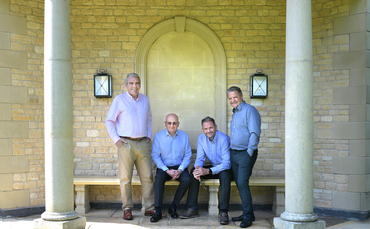
Selling an advice practice is an emotional, sometimes fraught, journey for business owners throughout which they need support to achieve the right outcome for their clients, their staff and themselves, according to the four industry veterans that head Catalyst Partners.
Formed in 2018 by Roderic Rennison and John Chapman, Catalyst Partners works with IFA business owners looking to sell. It helps them find the right home for their “life’s work” and supports them during the process.
The duo quickly evolved into a quartet with the addition of Martyn Laverick and Andrew Cumming – both of whom are former IFA business owners who sold up – and the firm now finds itself at the beating heart of the thriving UK advice consolidation market.
Between 2018 and 2022 it was involved in about 35 IFA sales, adding another ten to its tally in 2023 which covered close to £3bn of assets. The four experienced financial services professionals are at present assisting with another 30 or so sales at various stages of the process.
Human element
The partners tell PA it is not only the businesses that need prepping for sale – business owners need to mentally prepare for the consequences of selling.
Laverick, who has worked in mergers and acquisitions (M&A) for the past decade and sold his IFA firm back in 2000, says as he has been through the process, he can see deals from all angles.
“There is the aspect of knowing the deals, the terms, the negotiation but there is also a human element of this. This is not just about a transaction this is about someone who is selling a business, that business may be their life’s work. It is like handing your baby over to someone.
“The emotional journey they go through is quite immense.”
He adds: “Having been through it myself you feel you are able to hold somebody’s hand through that journey because it does get quiet tense.
“Not only are they trying to sell a business they are trying to run a business, see clients, while external people are questioning their business, trying to pick holes in it.
“There is a lot of coaching that goes on with clients during that process.”
Laverick says a key part of the firm’s role is “holding the client’s hand”. He explains: “Whether we like it or not we hold the client’s hand all the way through the journey. When they lose it, and they get cross, they shout at us which is fine – better to do that than the acquirer who may be their boss in a few months.
“The acquirer shouts at us when things are not happening quickly enough. We sit in the middle but that is our job, that is what we get paid for.
“It is very much our job to manage this emotional rollercoaster that IFA sellers go on.”
Cumming headed up Scott Moncrieff Wealth Management, which had ten advisers, and sold to Close Brothers in 2011. He stayed with Close Brothers and became head of advice in 2014 and eventually left in 2021.
He says Catalyst Partners works differently to others in the marketplace: “We have deep experience here, and combined with that deep experience you very often get us working in pairs. That can be very valuable for the client as we bring different levels of expertise.
“Very often I am involved with the integrated side as Close Brothers was a big vertically integrated firm.
“The four pairs of eyes thing works very well for the client firstly in the actual scouting of who would be a compatible buyer and secondly in the practical side of holding the client’s hand through the journey. Very often they have two wells of experience to dip into and ask questions of.”
He adds: “Secondly what differentiates us in this marketplace is that we are advisers, we are paid a fee to deliver a deep value to a client. We are not like a broker that is interested in a transaction and the highest bidder that pays us.
“The four of us have been around a lot. We would not get involved with a client unless we knew we could add value with our input.
“Integrity, being free to work with who we like and being free to say what we like is very important to us. We are advisers primarily and that is what sets us apart from other people in the space.”
Forward-looking
Rennison has been in financial services all his working life and has held senior management roles in a number of major financial services intermediaries, life insurance companies and professional firms including Robson Rhodes, now part of Grant Thornton, Merrill Lynch, Bradford & Bingley and Thinc.
He tells PA Catalyst’s process squarely sets out the consequences of the sale at the initial meeting.
“We normally have two of us at the initial meeting, we want to ensure they understand the consequences of what they are doing. We also look at alternatives – have they considered a buyout, employee ownership trust, what is their motivation for selling, is their partner/spouse on board?”
Rennison describes a case where an adviser business owner was set on selling up but after discussion with his partner the deal was put on hold until they were both ready for their lives to radically change.
Laverick explains advisers who sell up will experience “dramatic” life changes: “Some business owners just want to get back to advising clients – we have many clients who have sold are now loving life as an adviser.
“Others want to sell, get the business integrated and go. If you have never filled out a holiday request form for 20 years, suddenly you might have to, and it doesn’t go down well.
“Your world is very different when the deal completes, you have to understand that, if you don’t it will be a nightmare.”
Rennison adds: “I spent four/five hours with a client in Scotland last week. An hour of that was talking about what he thought he would do after the sale. It is very important to get them well positioned mentally for it or it does not work for the buyer or the seller.”
Clients first
All four partners are adamant that clients play a pivotal role in any and all deal-related decisions.
“The majority of businesspeople that we are working with really care about their clients. This is not lip service,” says Laverick. “It is clients, staff and then them [business owners] – they are the priorities for the deal.
“Because if it works for the clients, generally the staff are happy, therefore the deal will work and you are happy.
“This is not saying what people like to hear, they are genuinely like that. Everything centres around what the client experience going to be like. That drives the majority of the conversations that we have. If there is a good fit, a good culture and charging structure, it actually starts to work quite well.
“If you focus on the client it tends to be a good outcome.”
Rennison agrees: “We worry about people who come to us and say how much am I going to get for my business and nothing else, that is a big warning sign for us.”
Cumming adds clients are central to Catalyst’s thinking: “You hear M&A advisers and brokers talking to sellers and very rarely is the client mentioned. At Catalyst we mention clients all the time. If the client does not go on the journey to the new advisory firm, it is not a good transaction.”
Whole of market
Chapman, a Chartered accountant, has worked in senior positions in a number of financial services businesses, including the finance director of a Japanese-owned private equity firm, prior to becoming managing director of Torquil Clark, the national IFA business.
He led the firm’s growth strategy resulting in the acquisition of four businesses in eighteen months and the ultimate sale in 2008 to Skipton Building Society.
He says Catalyst Partners is truly whole of market: “We know all the acquirers, we know their strategies, culture, what they will do with clients/staff and their deal structures. Having all the knowledge of the acquirers we can guide people who are selling into the best home, where it will suit them.
“We focus heavily on their clients, their staff, it is absolutely essential.
“The other main benefit of working with us is that we are solely working for the seller to get the best outcome for them.”
He explains that as well as supporting IFA sellers the partners get involved in the “minutiae of negotiation”.
“We will negotiate with the buyer to try to get the best possible outcome. It is not just the financial outcome, it is getting the best possible outcome for the staff, clients and owners. That is the most important thing – we are working for the seller, for their benefit.”
Laverick adds: “You have got four people here with a lot of experience within financial services in one shape or form. Everyone here has worked at board level. We have worked on the acquirer side as well as vendor side, it allows us to help sellers understand what buyers are looking for.
“We know what buyers do when looking at deals as we have been there ourselves. We bring that level of expertise into the deal to get our clients prepared.”
He explains the partnership works purely on the sell side with businesses who want to exit. “We bring knowledge from the acquirer’s side into the sell side to help get them prepared to sell before they go to market.
“For example, there are many things when you look at an IFA business, you spend a lot of time putting together data which we then play back to the client. In that data there may be certain holes that acquirers will want to drill down on or there may be certain issues that need to be addressed before we go to market.
“It is getting out client match ready before we start to front them up to the marketplace.”
“There is a well-worn statistic that 70% of transactions do not deliver either lasting value to the buyer let alone end up with the seller being satisfied,” comments Rennison. “We are trying to be the 30% and expand beyond 30% that are successful. It is the effort that you put into that that matters.”
“The way we run our business model is we split the relationships in terms of trying to know the CEO or head of acquisitions at the acquiring firms, we split these relationships so we have about 15 each,” comments Cumming. “We know the acquiring marketplace inside out probably like no other firm.”
Consolidating the consolidators: Look out for part two of this interview next week
This post was originally published on this site be sure to check out more of their content





